英语语法:分词练习
- 格式:docx
- 大小:20.50 KB
- 文档页数:5
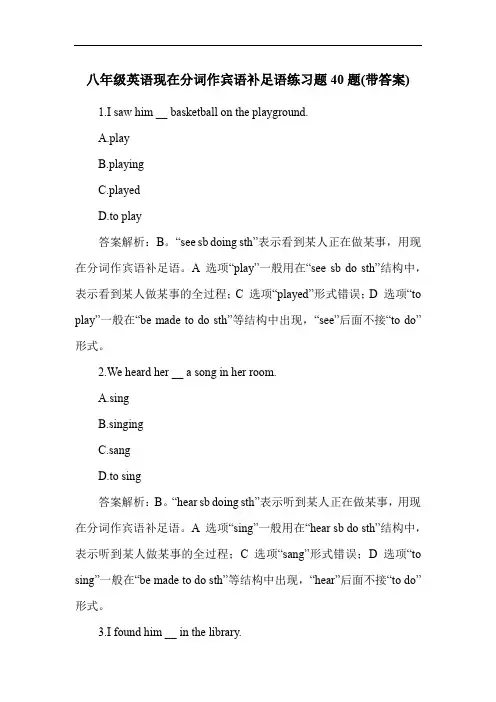
八年级英语现在分词作宾语补足语练习题40题(带答案)1.I saw him __ basketball on the playground.A.playB.playingC.playedD.to play答案解析:B。
“see sb doing sth”表示看到某人正在做某事,用现在分词作宾语补足语。
A 选项“play”一般用在“see sb do sth”结构中,表示看到某人做某事的全过程;C 选项“played”形式错误;D 选项“to play”一般在“be made to do sth”等结构中出现,“see”后面不接“to do”形式。
2.We heard her __ a song in her room.A.singB.singingC.sangD.to sing答案解析:B。
“hear sb doing sth”表示听到某人正在做某事,用现在分词作宾语补足语。
A 选项“sing”一般用在“hear sb do sth”结构中,表示听到某人做某事的全过程;C 选项“sang”形式错误;D 选项“to sing”一般在“be made to do sth”等结构中出现,“hear”后面不接“to do”形式。
3.I found him __ in the library.B.readingC.to readD.reads答案解析:B。
“find sb doing sth”表示发现某人正在做某事,用现在分词作宾语补足语。
A 选项“read”一般用在“find sb do sth”结构中,表示发现某人做某事的全过程;C 选项“to read”一般在“be made to do sth”等结构中出现,“find”后面不接“to do”形式;D 选项“reads”形式错误。
4.We watched them __ games.A.playB.playingC.playedD.to play答案解析:B。
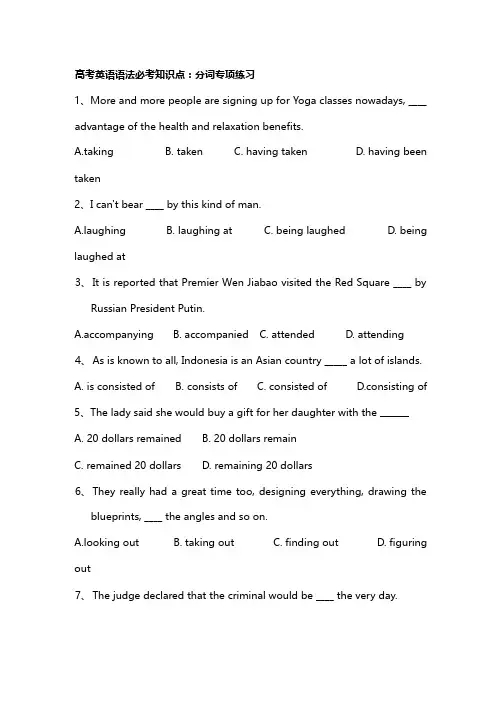
高考英语语法必考知识点:分词专项练习1、More and more people are signing up for Yoga classes nowadays, ____ advantage of the health and relaxation benefits.A.takingB. takenC. having takenD. having been taken2、I can't bear ____ by this kind of man.ughingB. laughing atC. being laughedD. being laughed at3、It is reported that Premier Wen Jiabao visited the Red Square ____ byRussian President Putin.A.accompanyingB. accompaniedC. attendedD. attending4、As is known to all, Indonesia is an Asian country _____ a lot of islands.A. is consisted ofB. consists ofC. consisted ofD.consisting of5、The lady said she would buy a gift for her daughter with theA. 20 dollars remainedB. 20 dollars remainC. remained 20 dollarsD. remaining 20 dollars6、They really had a great time too, designing everything, drawing theblueprints, ____ the angles and so on.A.looking outB. taking outC. finding outD. figuring out7、The judge declared that the criminal would be ____ the very day.A.hangB. hangedC. hungD. hunged8、Have you got used to ____ like this?A. be treatedB. have been treatedC. being treatedD. treatment9、___ help the people in the snowstorm in the south made him worried.A.Not known how to B.Unknown what to do toC.His knowing not how to D.His not knowing how to10、Tom, could you get the film ____ for me, please?A.washedB. printedC. madeD. developedKeys:1、A2、D3、B4、D5、D6、D7、B8、C9、D 10、D分词可分为现在分词和过去分词两种,属于非谓语动词,在句子里不能充当谓语动词。
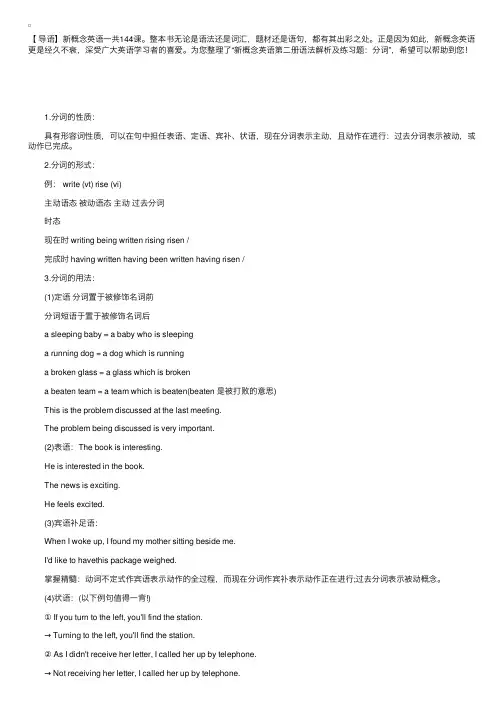
【导语】新概念英语⼀共144课。
整本书⽆论是语法还是词汇,题材还是语句,都有其出彩之处。
正是因为如此,新概念英语更是经久不衰,深受⼴⼤英语学习者的喜爱。
为您整理了“新概念英语第⼆册语法解析及练习题:分词”,希望可以帮助到您! 1.分词的性质: 具有形容词性质,可以在句中担任表语、定语、宾补、状语,现在分词表⽰主动,且动作在进⾏:过去分词表⽰被动,或动作已完成。
2.分词的形式: 例: write (vt) rise (vi) 主动语态被动语态主动过去分词 时态 现在时 writing being written rising risen / 完成时 having written having been written having risen / 3.分词的⽤法: (1)定语分词置于被修饰名词前 分词短语于置于被修饰名词后 a sleeping baby = a baby who is sleeping a running dog = a dog which is running a broken glass = a glass which is broken a beaten team = a team which is beaten(beaten 是被打败的意思) This is the problem discussed at the last meeting. The problem being discussed is very important. (2)表语:The book is interesting. He is interested in the book. The news is exciting. He feels excited. (3)宾语补⾜语: When I woke up, I found my mother sitting beside me. I'd like to havethis package weighed. 掌握精髓:动词不定式作宾语表⽰动作的全过程,⽽现在分词作宾补表⽰动作正在进⾏;过去分词表⽰被动概念。
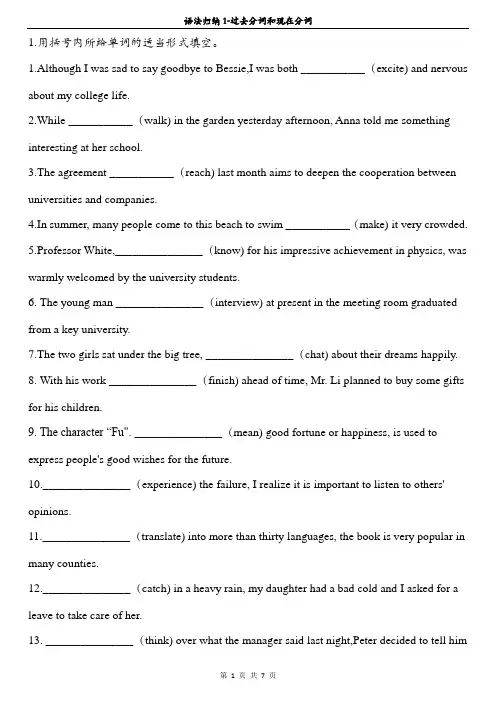
1.用括号内所给单词的适当形式填空。
1.Although I was sad to say goodbye to Bessie,I was both ___________(excite) and nervous about my college life.2.While ___________(walk) in the garden yesterday afternoon, Anna told me something interesting at her school.3.The agreement ___________(reach) last month aims to deepen the cooperation between universities and companies.4.In summer, many people come to this beach to swim ___________(make) it very crowded.5.Professor White,_______________(know) for his impressive achievement in physics, was warmly welcomed by the university students.6. The young man _______________(interview) at present in the meeting room graduated from a key university.7.The two girls sat under the big tree, _______________(chat) about their dreams happily.8. With his work _______________(finish) ahead of time, Mr. Li planned to buy some gifts for his children.9. The character “Fu". _______________(mean) good fortune or happiness, is used to express people's good wishes for the future.10._______________(experience) the failure, I realize it is important to listen to others' opinions.11._______________(translate) into more than thirty languages, the book is very popular in many counties.12._______________(catch) in a heavy rain, my daughter had a bad cold and I asked for a leave to take care of her.13. _______________(think) over what the manager said last night,Peter decided to tell himthe truth.14. A few days later, the young waiter received their letter, _______________(say),"We will invite you to New York to run a hotel."15. _______________(achieve) his goal of climbing to the top of the mountain, Oliver set another goal for himself.II.用方框内所给单词的适当形式填空。
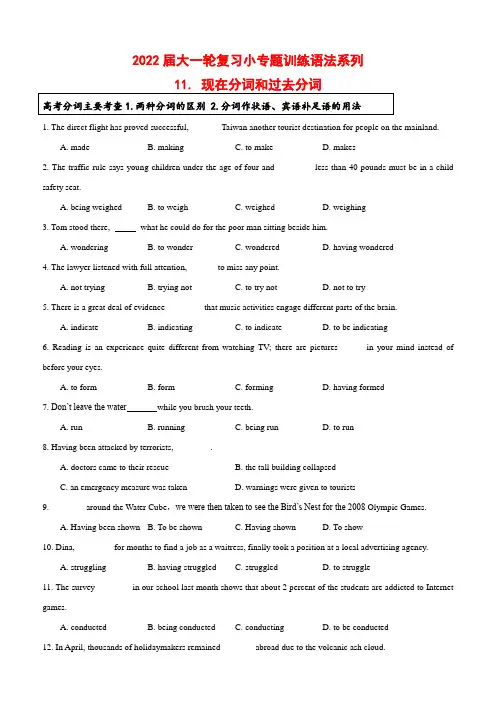
2022届大一轮复习小专题训练语法系列11. 现在分词和过去分词1. The direct flight has proved successful, _______Taiwan another tourist destination for people on the mainland.A. madeB. makingC. to makeD. makes2. The traffic rule says young children under the age of four and ________ less than 40 pounds must be in a child safety seat.A. being weighedB. to weighC. weighedD. weighing3. Tom stood there, what he could do for the poor man sitting beside him.A. wonderingB. to wonderC. wonderedD. having wondered4. The lawyer listened with full attention, ______ to miss any point.A. not tryingB. trying notC. to try notD. not to try5. There is a great deal of evidence ________ that music activities engage different parts of the brain.A. indicateB. indicatingC. to indicateD. to be indicating6. Reading is an experience quite different from watching TV; there are pictures _____ in your mind instead of before your eyes.A. to formB. formC. formingD. having formed7. Don’t leave the water while you brush your teeth.A. runB. runningC. being runD. to run8. Having been attacked by terrorists, ________.A. doctors came to their rescueB. the tall building collapsedC. an emergency measure was takenD. warnings were given to tourists9. ________around the Water Cube,we were then taken to see the Bird’s Nest for the 2008 Olympic Games.A. Having been shownB. To be shownC. Having shownD. To show10. Dina, ________ for months to find a job as a waitress, finally took a position at a local advertising agency.A. strugglingB. having struggledC. struggledD. to struggle11. The survey ________in our school last month shows that about 2 percent of the students are addicted to Internet games.A. conductedB. being conductedC. conductingD. to be conducted12. In April, thousands of holidaymakers remained _______ abroad due to the volcanic ash cloud.A. stickingB. stuckC. to be stuckD. to have stuck13. Though ________ to see us, the professor gave us a warm welcome.A. surpriseB. was surprisedC. surprisedD. being surprised14. Alexander tried to get his work ________ in the medical circles.A. to recognizeB. recognizingC. recognizeD. recognized15. The living room is clean and tidy, with a dining table already ______ for a meal to be cooked.A. laidB. layingC. to layD. being laid16. The experiment shows that proper amounts of exercise, if ______ regularly, can improve our health.A. being carried outB. carrying outC. carried outD. to carry out17. ______ from the top of the tower, the south foot of the mountain is a sea of trees.A. SeenB. SeeingC. Have seenD. To see18.________ that her mother would come back soon,the girl calmed down.A. Having convincedB. Being convincedC. ConvincingD. Convinced19. Faced with a bill for $10,000,________.A. John has taken an extra jobB. the boss has given john an extra jobC. an extra job has been takenD. an extra job has been given to John20. Michael put up a picture of Yao Ming beside the bed to keep himself _____ of his own dreams.A. remindingB. to remindC. remindedD. remind21. TV programmes, ______ to bring the old and the young together, are growing in popularity all over the world.A. designedB. to be designedC. designingD. having designed22. With the victory at the French Open, Li Na has reached NO. 4 in the world, ______ the previous Asian record.A. equaledB. equalingC. to have equaledD. having equaled23. —How did he break his head while swimming?—my warnings, he dived straight into the shallow water.A. To ignoreB. IgnoredC. IgnoringD. Being ignored24. their final medical check, the astronauts boarded their spacecraft.A. ReceivedB. Being receivedC. To receiveD. Having received25. Henry can’t attend the party _______ at Tom’s house at present because he is preparing tomorrow’s presentation.A. holdB. to holdC. to be heldD. being held26. While building a tunnel through the mountain, ________.A. an underground lake was discoveredB. there was an underground lake discoveredC. a lake was discovered undergroundD. the workers discovered an underground lake27. —How do you know so much about what’s going on in the countryside?—I’ve got a friend there who keeps me ________.A. informingB. to be informedC. informedD. being informed28. Bats are surprisingly long lived creatures, some _________a life span of around 20 years.A. havingB. hadC. haveD. to have29. When ________ about one of the biggest concerns today, many people mention the sharp rise in prices.A. askingB. to askC. having askedD. asked30. ________ , the more xpen4esive the camera, the better its quality.A. General speakingB. Speaking GeneralC. Generally speakingD. Speaking generally2022届大一轮复习小专题训练语法系列(11)答案及解析1. B。
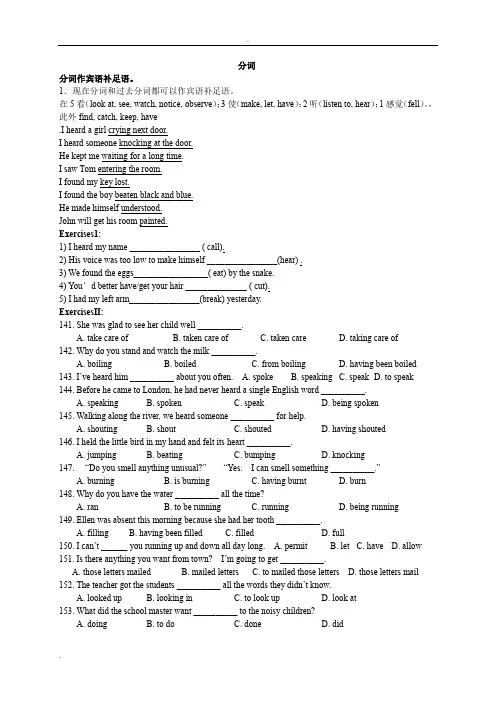
分词分词作宾语补足语。
1.现在分词和过去分词都可以作宾语补足语。
在5看(look at, see, watch, notice, observe);3使(make, let, have);2听(listen to, hear);1感觉(fell)。
,此外find, catch, keep, have.I heard a girl crying next door.I heard someone knocking at the door.He kept me waiting for a long time.I saw Tom entering the room.I found my key lost.I found the boy beaten black and blue.He made himself understood.John will get his room painted.Exercises1:1) I heard my name ________________ ( call).2) His voice was too low to make himself ________________(hear) .3) We found the eggs_________________( eat) by the snake.4) You’d better have/get your hair ______________ ( cut).5) I had my left arm________________(break) yesterday.ExercisesII:141. She was glad to see her child well __________.A. take care ofB. taken care ofC. taken careD. taking care of142. Why do you stand and watch the milk __________.A. boilingB. boiledC. from boilingD. having been boiled 143. I’ve heard him __________ about you often. A. spoke B. speaking C. speak D. to speak 144. Before he came to London, he had never heard a single English word __________.A. speakingB. spokenC. speakD. being spoken145. Walking along the river, we heard someone __________ for help.A. shoutingB. shoutC. shoutedD. having shouted146. I held the little bird in my hand and felt its heart __________.A. jumpingB. beatingC. bumpingD. knocking147. ---“Do you smell anything unusual?” ---“Yes. I can smell something __________.”A. burningB. is burningC. having burntD. burn148. Why do you have the water __________ all the time?A. ranB. to be runningC. runningD. being running149. Ellen was absent this morning because she had her tooth __________.A. fillingB. having been filledC. filledD. full150. I can’t ______ you running up and down all day long. A. permit B. let C. have D. allow 151. Is there anything you want from town? I’m going to get __________.A. those letters mailedB. mailed lettersC. to mailed those lettersD. those letters mail 152. The teacher got the students __________ all the words they didn’t know.A. looked upB. looking inC. to look upD. look at153. What did the school master want __________ to the noisy children?A. doingB. to doC. doneD. did154. They wanted the work _______with great care. A. to have done B. to be done C. doing D. to do 155. I need this chapter _______ before tomorrow. A. rewriting B. rewritten C. rewrite D. to write again156. Having read the Emperor’s New Clothes, we all found it __________.A. interestB. interestedC. interestingD. to interest157. When she returned home, she found the window open and something __________.A. to stealB. losingC. missedD. stolen158. My hometown is found __________.A. complete changingB. having completely changedC. completely changepletely changed 159. We found many people __________ in the meeting room.A. seatB. seatingC. to seatD. seated160. There was so much noise that the speaker could not make himself _________.A. being heardB. heardC. hearingD. hear161. Because of my poor English I’m afraid I can’t make myself _________.A. understandB. be understoodC. understoodD. understanding162. Don’t let him __________ you __________ for a long time.A. to make, waitB. make, to waitC. make, waitD. to make, to wait163. He kept me __________ for many hours.A. to waitB. having been waitedC. waitingD. waited164. Mother caught the boy _____in the corner. A. smoke B. to smoke C. smoking D. being smoked 165. John left his coat __________ on the sofa.. A. laying B. lying C. laid D. lain答案:141-145 BACBA 146-150 BACCC151-155 ACCBB156-160 CDDDB161-165 CCCCB分词做状语主动被动1) 一般式writing being written2) 完成式having written having been written1. Feeling tired, Tom went to bed early.2. Not wanting to wake her, Steve left the house silently3. Having finished his homework, he went out.4. Asked by my mother, I was eager to help her solve the snake problem.5. Having been told many times, she still can’t remember it.6. Given more time, I can do it better现在分词或分词短语做状语时,也可以表示时间、原因、结果、条件、让步、方式、伴随状况等.其逻辑主语必须和句子的主语一致,有时with\without +名词或代词宾格+分词也可以表示伴随状况如: While reading the book, he nodded from time to time. (时间)The teacher stood there, surrounded by the students. (方式)He sent me an e-mail, hoping to get further information.(伴随)分词作时间状语,如果先与主动词的动作,且强调先后,要用having done。
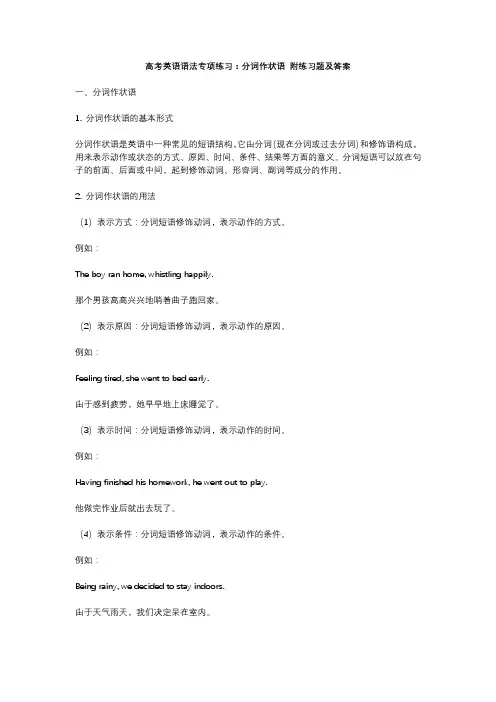
高考英语语法专项练习:分词作状语附练习题及答案一、分词作状语1. 分词作状语的基本形式分词作状语是英语中一种常见的短语结构,它由分词(现在分词或过去分词)和修饰语构成,用来表示动作或状态的方式、原因、时间、条件、结果等方面的意义。
分词短语可以放在句子的前面、后面或中间,起到修饰动词、形容词、副词等成分的作用。
2. 分词作状语的用法(1)表示方式:分词短语修饰动词,表示动作的方式。
例如:The boy ran home, whistling happily.那个男孩高高兴兴地哨着曲子跑回家。
(2)表示原因:分词短语修饰动词,表示动作的原因。
例如:Feeling tired, she went to bed early.由于感到疲劳,她早早地上床睡觉了。
(3)表示时间:分词短语修饰动词,表示动作的时间。
例如:Having finished his homework, he went out to play.他做完作业后就出去玩了。
(4)表示条件:分词短语修饰动词,表示动作的条件。
例如:Being rainy, we decided to stay indoors.由于天气雨天,我们决定呆在室内。
(5)表示结果:分词短语修饰动词,表示动作的结果。
例如:The boy fell off his bike, hurting his knee.那个男孩从自行车上摔下来,伤了膝盖。
3. 分词作状语的构成(1)现在分词作状语通常用来表示动作进行的方式、原因、时间、条件等,常常放在谓语动词之后,或者放在句首,用逗号与句子分开。
例如:He walked down the street, whistling a tune.他哼着曲子沿街走去。
Whistling a tune, he walked down the street.哼着曲子,他沿街走去。
(2)过去分词作状语通常用来表示动作已经完成或者被完成的情况,常常放在谓语动词之后,或者放在句首,用逗号与句子分开。
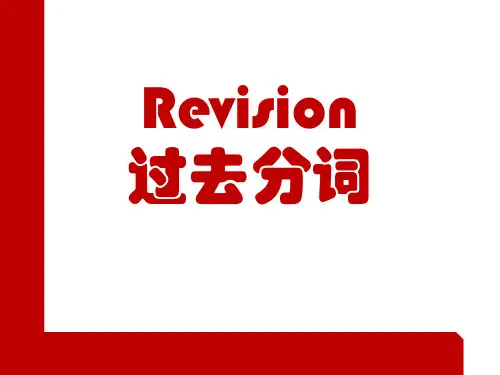
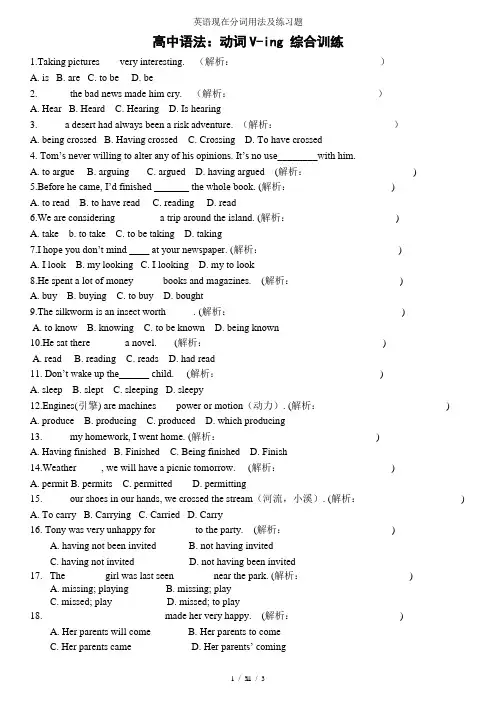
高中语法:动词V-ing 综合训练1.Taking pictures ___ very interesting. (解析:)A. isB. areC. to beD. be2.______ the bad news made him cry. (解析:)A. HearB. HeardC. HearingD. Is hearing3._____ a desert had always been a risk adventure. (解析:)A. being crossedB. Having crossedC. CrossingD. To have crossed4. Tom’s never willing to alter any of his opinions. It’s no use________with him.A. to argueB. arguingC. arguedD. having argued (解析:)5.Before he came, I’d finished _______ the whole book. (解析:)A. to readB. to have readC. readingD. read6.We are considering ________ a trip around the island. (解析:)A. take b. to take C. to be taking D. taking7.I hope you don’t mind ____ at your newspaper. (解析:)A. I lookB. my lookingC. I lookingD. my to look8.He spent a lot of money _____ books and magazines. (解析:)A. buyB. buyingC. to buyD. bought9.The silkworm is an insect worth _____. (解析:)A. to knowB. knowingC. to be knownD. being known10.He sat there ______ a novel. (解析:)A. readB. readingC. readsD. had read11. Don’t wake up the______ child.(解析:)A. sleepB. sleptC. sleepingD. sleepy12.Engines(引擎) are machines ___ power or motion(动力). (解析:)A. produceB. producingC. producedD. which producing13._____ my homework, I went home. (解析:)A. Having finishedB. FinishedC. Being finishedD. Finish14.Weather ____ , we will have a picnic tomorrow. (解析:)A. permitB. permitsC. permittedD. permitting15._____ our shoes in our hands, we crossed the stream(河流,小溪). (解析:)A. To carryB. CarryingC. CarriedD. Carry16. Tony was very unhappy for________to the party. (解析:)A. having not been invitedB. not having invitedC. having not invitedD. not having been invited17._ The________girl was last seen________near the park. (解析:)A. missing; playingB. missing; playC. missed; playD. missed; to play_______18.________________________ made her very happy. (解析:)A. Her parents will comeB. Her parents to comeC. Her parents cameD. Her parents’ coming提升拔高———高考链接:解题技巧1.对非谓语动词类考题,解题时首先要通过句子结构判断是否是非谓语动词,若句中有连词,则需用谓语动词形式,若句中没有连词,则考虑用非谓语动词形式,再通过分析句子成分判断应使用哪种非谓语动词。
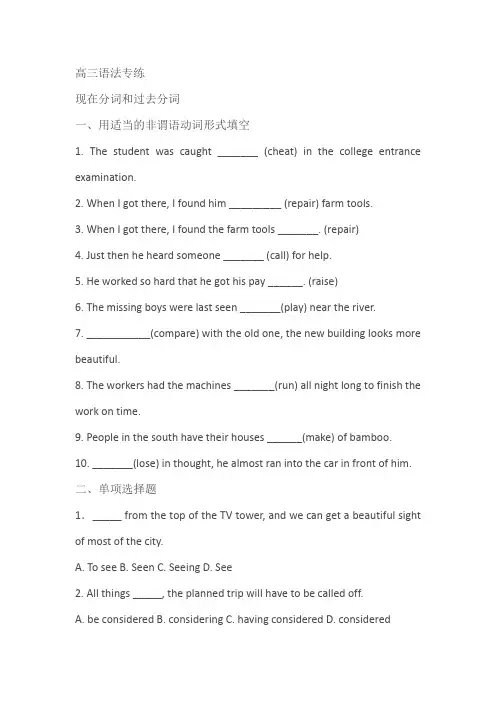
高三语法专练现在分词和过去分词一、用适当的非谓语动词形式填空1. The student was caught _______ (cheat) in the college entrance examination.2. When I got there, I found him _________ (repair) farm tools.3. When I got there, I found the farm tools _______. (repair)4. Just then he heard someone _______ (call) for help.5. He worked so hard that he got his pay ______. (raise)6. The missing boys were last seen _______(play) near the river.7. ___________(compare) with the old one, the new building looks more beautiful.8. The workers had the machines _______(run) all night long to finish the work on time.9. People in the south have their houses ______(make) of bamboo.10. _______(lose) in thought, he almost ran into the car in front of him.二、单项选择题1._____ from the top of the TV tower, and we can get a beautiful sight of most of the city.A. To seeB. SeenC. SeeingD. See2. All things _____, the planned trip will have to be called off.A. be consideredB. consideringC. having consideredD. considered3. ______ the big snake, the little girl stood under the tree _____ out of her life.A. Saw; frightenedB. Seen; frightenedC. To see; frighteningD. Seeing; frightened4. Generally speaking, ____ according to the directions, the drug has no side effect.A. When takingB. when takenC. when to takeD. when to be taken5. The research is so designed that once ______ nothing can be done to change it.A. beginsB. begunC. beginningD. having begun6. _____ in 1613, Harvard is one of the most famous universities in the United States.A. being foundedB. FoundedC. It was foundedD. Founding7. If you go to Xi’an, you will find the palaces there more magnificent than commonly _____.A. supposedB. supposingC. to supposeD. suppose8. _____ more attention, the tree could have grown better.A. GivenB. To giveC. GivingD. Having given9. In order not to be disturbed, I spent three hours _____ in my study.A. lockingB. to lockC. lockedD. being locked10. _____ with the size of the whole earth, the highest mountain does not seem high at all.A. When comparedB. CompareC. While comparingD. Comparing11. Mrs. Bush stood ______ for a moment when an old soldier suddenly appeared before her.A. surprisedB. surprisingC. being surprisedD. to be surprised12. ____ alone in the dark room, the little boy was so frightened as to cry.A. LeavingB. LeftC. To be leftD. Having left13. _____ to complete the job on time, they set out to work immediately.A. Being determinedB. On having determinedC. DeterminedD. To be determined14. ______ in a friendly way, their quarrel came to an end.A. Being settledB. Having settledC. SettledD. Settling15. _____to work overtime that evening, I missed an important appointment.A. Having been askedB. To askC. Having askedD. To be asked16.______ how to read the new words, I often look them up in the dictionary.A. Having not knownB. Not to knowC. Don’t knowD. Not knowing17. You can fly to the UK this morning _____ you don’t mind changing planes in Hong Kong.A. becauseB. providedC. unlessD. so far as18. _____ in this way, the situation doesn’t seem so disappointing.A. To lookB. Looking atC. Looked atD. To be looked at19. _____ in a recent science competition, the three students were awarded scholarship totaling 21,000 dollars.A. To be judged the bestB. Judged the bestC. Having judged the bestD. Judging the best20. A cool rain was falling, _____ with snow.A. mixedB. mixingC. to mixD. having mixed分词专练Keys:1. cheating2. repairing3. repaired4. calling5. raised6. playing7. Compared8. running9. made 10. Lost1~5 DDDBB 6~10 BAACA 11~15 ABCCA 16~20 DBCBA分词专练Keys:1. cheating2. repairing3. repaired4. calling5. raised6. playing7. Compared8. running9. made 10. Lost1~5 DDDBB 6~10 BAACA 11~15 ABCCA 16~20 DBCBA分词专练Keys:1. cheating2. repairing3. repaired4. calling5. raised6. playing7. Compared8. running9. made 10. Lost1~5 DDDBB 6~10 BAACA 11~15 ABCCA 16~20 DBCBA分词专练Keys:1. cheating2. repairing3. repaired4. calling5. raised6. playing7. Compared8. running9. made 10. Lost 1~5 DDDBB 6~10 BAACA 11~15 ABCCA 16~20 DBCBA 分词专练Keys:1. cheating2. repairing3. repaired4. calling5. raised6. playing7. Compared8. running9. made 10. Lost 1~5 DDDBB 6~10 BAACA 11~15 ABCCA 16~20 DBCBA 分词专练Keys:1. cheating2. repairing3. repaired4. calling5. raised6. playing7. Compared8. running9. made 10. Lost 1~5 DDDBB 6~10 BAACA 11~15 ABCCA 16~20 DBCBA。
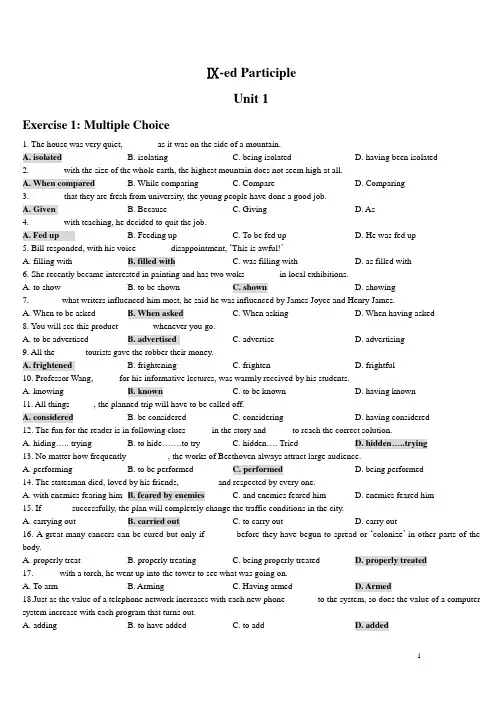
Ⅸ-ed ParticipleUnit 1Exercise 1: Multiple Choice1. The house was very quiet, _______ as it was on the side of a mountain.A. isolatedB. isolatingC. being isolatedD. having been isolated2. _______ with the size of the whole earth, the highest mountain does not seem high at all.A. When comparedB. While comparingC. CompareD. Comparing3. _______ that they are fresh from university, the young people have done a good job.A. GivenB. BecauseC. GivingD. As4. _______ with teaching, he decided to quit the job.A. Fed upB. Feeding upC. To be fed upD. He was fed up5. Bill responded, with his voice _______ disappointment, …This is awful!‟A. filling withB. filled withC. was filling withD. as filled with6. She recently became interested in painting and has two woks _______ in local exhibitions.A. to showB. to be shownC. shownD. showing7. _______what writers influenced him most, he said he was influenced by James Joyce and Henry James.A. When to be askedB. When askedC. When askingD. When having asked8. You will see this product _______ whenever you go.A. to be advertisedB. advertisedC. advertiseD. advertising9. All the ______ tourists gave the robber their money.A. frightenedB. frighteningC. frightenD. frightful10. Professor Wang, _____ for his informative lectures, was warmly received by his students.A. knowingB. knownC. to be knownD. having known11. All things _____, the planned trip will have to be called off.A. consideredB. be consideredC. consideringD. having considered12. The fun for the reader is in following clues _____ in the story and _____ to reach the correct solution.A. hiding….. tryingB. to hide…….to tryC. hidden…. TriedD. hidden…..trying13. No matter how frequently _________, the works of Beethoven always attract large audience.A. performingB. to be performedC. performedD. being performed14. The statesman died, loved by his friends, ________ and respected by every one.A. with enemies fearing himB. feared by enemiesC. and enemies feared himD. enemies feared him15. If ______ successfully, the plan will completely change the traffic conditions in the city.A. carrying outB. carried outC. to carry outD. carry out16. A great many cancers can be cured but only if ______ before they have begun to spread or …colonize‟ in other parts of the body.A. properly treatB. properly treatingC. being properly treatedD. properly treated17.______with a torch, he went up into the tower to see what was going on.A. To armB. ArmingC. Having armedD. Armed18.Just as the value of a telephone network increases with each new phone _______to the system, so does the value of a computer system increase with each program that turns out.A. addingB. to have addedC. to addD. added19. ______what writers influenced him most, he said he was influenced by Henry James.A. When to be askedB. When askedC. When askingD. When having asked20. Good news was sometimes released prematurely, with the British recapture of the port _______ half a day before the defenders actually surrendered.A. to announceB. announcedC. announcingD. was announced21 Do n‟t use words, expressions, or phrases _____ only to people with specific knowledge.A. being knownB. having been knownC. to be knownD. known22 There have been several new events _____ to the program for the 2008 Beijing Olympic Games.A. addB. to addC. addingD. added23 Five people won the “China‟s Green Figure” award, a title _____to ordinary people for their contribution to environmental protection.A. being givenB. is givenC. givenD. was given24 Jenny hopes that Mr. Smith will suggest a good way to have her written English _____ in a short period.A. improvedB. improvingC. to improveD. improve25 ----Come on, please give me some ideas about the project.-----Sorry,. With so much work _____ my mind, I almost break down.A. filledB. fillingC. to fillD. being filled26 ______the claim that German is an economically powerful country, it is somewhat surprising how relatively small the German economy actually is.A. To giveB. GivenC. GivingD. Having given27 Any applicant form ______ properly will not be accepted by the company.A. not filledB. not to be filledC. not being filledD. not having been filled28 You should understand the traffic rule by now. You‟ve had it __often enough.A. explainingB. to explainC. explainD. explained29 The managers discussed the plan that they would like to see ______ the next year.A. carry outB. carrying outC. carried outD. to carry out30 China is a ______ country and we should introduce _______ science and technology from the _______ countries.A. developed; advanced; developedB. developing; advanced; developedC. developing; advancing; developingD. developed; advancing; developing31 The first textbook _______ for teaching English as a foreign language came out in the 16th century.A. having writtenB. to be writtenC. being writtenD. written32 The managers discussed the plan that they would like to see ____ the next year.A carry outB carrying outC carried outD to carry out33 Though still ________ today, the tea ceremony may not be as popular as it used to be.A. practiceB. being practicedC. to be practicedD. practicing34 The idea for new machine came to Mr. Baker ________to his invention recently.A. while devotingB. while devotedC. while he was devotedD. while devoted himself35 Many teachers were praised at the meeting, Mr. Zhou ________.A. includingB. being includingC. to includeD. includedExercise 2: Filling each blank with the proper form of the words given in the brackets.1 The door remained ________ (lock).2 All the ______ (frighten) tourists gave the robber their money.3 The glass of water is too hot. I prefer some cold ________(boil) water.4 Nearly half of the _______ (bore) audience had left the meeting before it was closed.5 This is a problem ________(discuss) the day before yesterday.6 They had wedding pictures________(take) yesterday7 I have put down every detail of the work ________(assign).8 _______(compare) with this, that is a matter of minor importance.9 He sat behind his office desk with his eyes (fix) _______on the television set.10 The_______(escape) prisoner was soon picked up again in the nearby forest.Exercise 3: Translate the following into English (-ed participle used as adverbial phrase is preferable)1综合考虑,他决定申请攻读普林斯顿大学信息工程专业。
-ing分词单句语法填空练习(二)难度:★★1. The film star wears sunglasses. Therefore, he can go shopping without ______(recognize).Key: ★★being recognized2. When it comes to ______ (speak) in public, no one can match him.Key: ★★speaking3. I couldn’t do my homework with all that noise ______(go) on.Key: ★★going4. I smell something ______ (burn) in the kitchen. Can I call you back in a minute?Key: ★★burning5. Listening to music at home is one thing, going to hear it ______ (perform) live is quite another.Key: ★★being performed6. Shortly after suffering from a massive(巨大的) earthquake and ______ (reduce) to ruins, the city took on a new look.Key: ★★being reduced7. The next thing he saw was smoke ______ (rise) from behind the house.Key: ★★rising8. Lionel Messi, ______ (set) the record for the most foals in a calendar year, is considered the most talented football player in Europe.Key: ★★having set9. You can’t imagine what difficulty we had ______ (walk) home in the snowstorm.Key: ★★★walking10. It rained heavily in the south, ______ (cause) serious flooding in several provinces.Key: ★★causing11. The news shocked the public, ______ (lead) to great concern about students’ safety at school.Key: ★★leading12. More highways have been built in China, ______ (make) it much easier for people to travel from one place to another.Key: ★★making13. He got up late and hurried to his office, ______ (leave) the breakfast untouched.Key: ★★leaving14. Newly-built wooden cottages line the street, ______ (turn) the old town into a dreamland.Key: ★★turning15. ______ (separate) from other continents for millions of years, Australia has many plants and animals not found in any country in the world.Key: ★★Having been separated16. The manager, ______ (make) it clear to us that he didn’t agree with us, left the meeting room.Key: ★★having made17. The storm left, ______ (cause) a lot of damage to this area.Key: ★★having caused18. ______ (say) that she didn’t do a good job, I don’t think I am abler than her.Key: ★★Having said19. Lucy’s new job paid twice as much as she had made ______ (work) in the restaurant.Key: ★★working20. ______ (fail) to reach them on the phone, we sent an email instead.Key: ★★Having failed21. Dina, ______ (struggle) for months to find a job as a waitress, finally took a position at a local advertising agency. Key: ★★having struggled22. ______ (base) an important decision more on emotion than on reason, you will regret it sooner or later.Key: ★★Basing23. ______ (stand) in a long queue for half an hour, I suddenly found I have left my wallet behind.Key: ★★ Having stood24. I got to the office earlier that day, ______ (catch) the 7:30 train from Paddington.Key: ★★having caught25. ______ (eat) at the cafeteria before, Tina didn’t want to eat there again.Key: ★★Having eaten26. ______ (spend) the past year as an exchange student in Hong Kong, Linda appears more mature than those of her age.Key: ★★Having spent27. ______ (spend) nearly all our money, we couldn't afford to stay at a hotel.Key: ★★Having spent28. In recent years an English word "infospere" has appeared, ______ (combine) the sense of "information" and "atmosphere".Key: ★★combining29. ______ (work) for two days, Steve managed to finish his report on schedule.Key: ★★Having worked30. Many Chinese brands, ______ (develop) their reputations over centuries, are facing new challenges from the modern market.Key: ★★having developed31. One learn a language by making mistakes and ______ (correct) them.Key: ★★ correcting32. China recently tightened its waters controls near the Huangyan Island to prevent Chinese fishing boats from ______ (attack) in the South China Sea.Key: ★★ being attacked-ing分词单句语法填空练习(三)难度:★★★难33. ______ (tell) many times, he finally understood it.Key: ★★★Having been told34. Eugene's never willing to alter any of his opinions. It’s no use ______ (argue) with him.Key: ★★★arguing35. One of the things that we all hate is ______ (force) to do something that we don’t prefer to.Key: ★★★being forced36. The country has already sent up three unmanned spacecrafts, the most recent ______ (launch) at the end of last March.Key: ★★★having been launched37. He was busy writing a story, only ______ (stop) once in a while to smoke a cigarette.Key: ★★★stopping38. ______ (show) around the Water Cube, we were then taken to see the Bird’s Nest for the 2008 Olympic Games. Key: ★★★Having been shown39. The party will be held in the garden, weather ______ (permit).Key: ★★★permitting40. ______ (ask) to work overtime that evening, I missed a wonderful film.Key: ★★★Having been asked41. The lecture ______ (give), a lively question- and- answer session followed.Key: ★★★having been given42. I had as much fun sailing the seas as I now do ______ (work) with students.Key: ★★★ working43. Spielberg had gone through many failures before he became a famous director, one of which was not ______ (admit) to the university.Key: ★★★being admitted。
高中英语语法--现在分词作定语+练习语法精析动词的-ing形式既包括动名词又包括现在分词,在英语中使用极其广泛,同时也是高考中的重要考点。
下面就动词的-ing形式在句中作定语总结如下:1.动词的-ing形式作定语在句中通常有两个位置,如果是单个的动词的-ing形式作定语,常放在被修饰词前作前置定语;如果是动词的-ing形式的短语作定语,常放在被修饰词后作后置定语。
如:He is an attacking player.他是一个攻击型的运动员。
He asked an embarrassing question.他提了一个令人难堪的问题。
A little child learning to walk often falls.学走路的小孩常常跌跤。
Do you know the number of people coming to the party?你知道来参加晚会的人数吗?注意:当v.-ing形式作后置定语时,可以相当于相应的定语从句。
如:①表示经常性、习惯性动作或现在(当时)的状态(变为定语从句时多用一般现在时态或一般过去时态)。
The factory making these pens is a small one.→The factory which/that makes these pens is a small one.制造这些钢笔的工厂很小。
We lived in a room facing the south.→We lived in a room which/that faced the south.我们住在一个朝南的房间里。
②表示正在进行的动作(变为定语从句时要用进行时态)。
The girl sitting next to me was my cousin.→The girl who was sitting next to me was my cousin.坐在我旁边的姑娘是我表妹。
请同学们先做练习再听课,不断总结提高!请同学们先做练习再听课,不断总结提高!一,改写下列句子,其划线部分应改为分词短语1. Look round when you cross the street.2. When she heard the news, she burst into laughter.3. As she was still rather weak, she could not stay up for too long.4. Gentlemen always shake hands when they are introduced to each other.5. A cold rain was falling. It was mixed with snow.6. While we were walking in the street, we met some friends of ours.7. The old man walked slowly. He was supported by his little grandson.8. The ground which is covered with white snow looks very beautiful.9. There is a tall tree which covers the entrance to the cave.二,选择填空1. The danger ________ the world is too many people with too little food.A. threateningB. threatenedC. which is threatenedD. to be threatened2. The man _______ guards is a party leader.A. following byB. being followed byC. followedD. to be followed by3. He is an __________ professor.A. honouring and respectedB. honoured and respectedC. honoured and respectingD. honouring and respecting4. The lady __________ us from time to time taught us French..A. visitingB. visitedC. to visitD. having visited5. The situation proves ______________.A. encouragingB. encouragedC. to encourageD. being encouraged6. His actions make him __________, but not his words.A. respectingB. respectedC. respectD. to respect7. He watched the pictures ____________ on the wall.A. hangB. hungC. hangingD. being hung8. David, ___________, ran fast.A. not being seen anyoneB. not seen by anyoneC. didn’t see anyoneD. wasn’t seen by anyone9. A __________ gentleman will be the husband of this old widow.A. young-lookB. young-lookingC. young-lookedD. looking-young10. How can this __________ school teach children?A. bad-managingB. bad-managedC. badly-managedD. badly-managing11. _ ______ nothing to do, we played games.A. BeingB. I beingC. There beingD. There been12. __________, we cooked mutton.A. The fish having friedB. The fish having been friedC. The fish had been friedD. The fish were fried13. ____________, we went home.A. After this doingB. This doingC. This doneD. This having done14. I now pay you half the sum, the other half _________ next month.A. will be paidB. is paidC. being paidD. to be paid15. I read newspaper with the morning sun ___________ through the window.A. shinesB. shoneC. shiningD. to shine16. ___________ together, the situation seems hopeless.A. Taking all thingsB. Taken all thingsC. All things takingD. All things are taken17. _________ by his report, we have all failed.A. JudgingB. JudgedC. Being judgedD. Having judged18. ___________ that you are in the right, you should not get angry.A. GrantedB. GrantingC. To grantD. Having granted19. Forty students of this class have passed this year, ________last yearA. comparing withB. comparing toC. compared withD. compared20. _________ for several weeks, the city was short of food and clothing.A. As having floodedB. As floodedC. Having been floodedD. Being flooded21. ___________ as an old teacher, he is respected by his students.A. KnowingB. Having knownC. KnownD. To know22. _________ tomorrow’s lesson, I have no time to go out with you.A. Not preparingB. Not prepareC. Not being preparedD. Not having prepared23. He was so careless that he went out __________ the door___________.A. to leave; lockedB. leaving; unlockedC. having left; unlockedD. leaving; unlocking24. Because of my broken English, I’m afraid I can’t make myself __________.A. understandB. to be understoodC. understandingD. understood25. Snow was falling when they went along a path ______ to the mountain top.A. to leadB. ledC. leadingD. being led26. Most of the people ___________ to the party were famous scientists.A. invitedB. to be invitedC. being invitedD. inviting27. How I regretted the days _________ in doing the useless work.A. which were wastedB. being wastedC. to be wastedD. wasting28. The questions now _________ at the meeting are very important.A. being discussedB. to be discussedC. discussedD. which is discussing29. --- I was late this morning.--- I know. I saw you __________ towards the bus stop.A. running madlyB. running madC. to run madlyD. to run mad30. She was glad to see her child well _________ care of.A. takeB. to be takenC. takenD. taking31. The old man felt very sad with his son’s __________ in the battle.A. killingB. being killedC. killedD. to be killed32. Why do you have the water ________ all the time?A. ranB. to be runningC. runningD. run33. The students are told to have their exercise _________ in before 5.A. handB. to handC. handedD. handing34. What he said made us greatly _________.A. satisfyingB. satisfiedC. satisfyD. satisfaction35. What seemed _________ to him didn’t ______ us at all.A. interesting; interestingB. interesting; interestC. interested; interestD. interesting; interested36. --- Good morning, can I help you?--- I’d like to have this package ____________, madam.A. be weighedB. to be weighedC. to weighD. weighed37. _________ more attention, the trees could have grown better.A. GivenB. To giveC. GivingD. Having given38. I remember I heard this song _________ in a concert but I’ve never heard you _________ it.A. being sung; sangB. sang; singingC. sung; singD. to be sung; to sing39. When they saw the Olympic Games, they got very ___________.A. exciteB. excitedC. excitedlyD. exciting40. The __________ look on his face suggested that he __________ that.A. surprising; had expectedB. surprised; hadn’t expectedC. surprising; would expectD. surprised; shouldn’t expected41. ___________ the lab, they were taken to see the library.A. Having shownB. Having been shownC. In order to showD. To have been shown42. The Olympic Games, __________ in 776 BC, did not include women players until 1912.A. first playingB. to be first playingC. first playedD. to be first playing43. Just after putting away the dishes, ___________.A. the doorbell rang loudB. Nancy heard the doorbell ringC. someone knocked at the doorD. the doorbell was rung44. On his visit to the school years later, Peter was astonished to find himself _________ at once.A. rememberingB. rememberedC. being rememberedD. having remembered45. All the scientists _________ will attend the lecture.A. who invitedB. invitedC. that have invitedD. have been invited46. __ ________, blood ran down his nose.A. He fell to the groundB. Falling to the groundC. When he fell to the groundD. Having fallen47. --- Why not light a lamp there?--- There is a __________ lamp already.A. lightingB. litC. lightedD. litted48. We found the ground covered with ___________ leaves.A. fallenB. fellC. fallingD. having fallen49. Hearing the news, _____________.A. and he couldn’t keep back his tearsB. tears came to his eyesC. she had began to cryD. she burst into tears50. __________ from you for months, we missed you very much.A. Having not heardB. Not having heardC. Not heardD. Not having received一,改写下列句子,其划线部分应改为分词短语10. Look round when you cross the street.(when) crossing the street11. When she heard the news, she burst into laughter.(when) hearing the news , she burst into laughter12. As she was still rather weak, she could not stay up for too long.(as) being still rather weak , she could not stay up for too long13. Gentlemen always shake hands when they are introduced to each other.(when) introduced to each other14. A cold rain was falling. It was mixed with snow.A cold rain was falling with(as) Mixed with snow15. While we were walking in the street, we met some friends of ours.( while) walking in the street, we met some friends of ours .16. The old man walked slowly. He was supported by his little grandson.With(as) Supported by his little grandson 17. The ground which is covered with white snow looks very beautiful.Covered with white snow18. There is a tall tree which covers the entrance to the cave.Covering the entrance to the cave二,选择填空A. threateningB. threatenedC. which is threatenedD. to be threatenedA. following byB. being followed byC. followedD. to be followed by3. He is an __________ professor.A. honouring and respectedB. honoured and respectedC. honoured and respectingD. honouring and respectingA. visitingB. visitedC. to visitD. having visited5. The situation proves ______________.A. encouragingB. encouragedC. to encourageD. being encouraged6. His actions make him __________, but not his words.A. respectingB. respectedC. respectD. to respectA. hangB. hungC. hangingD. being hungA. not being seen anyoneB. not seen by anyoneC. didn’t see anyoneD. wasn’t seen by anyone9. A __________ gentleman will be the husband of this old widow.A. young-lookB. young-lookingC. young-lookedD. looking-youngA. bad-managingB. bad-managedC. badly-managedD. badly-managingA. BeingB. I beingC. There beingD. There beencooked mutton.A. The fish having friedB. The fish having been friedC. The fish had been friedD. The fish were friedA. After this doingB. This doingC. This doneD. This having doneA. will be paidB. is paidC. being paidD. to be paidA. shinesB. shoneC. shiningD. to shineA. Taking all thingsB. Taken all thingsC. All things takingD. All things are taken17. _________ by his report, we have all failed.A. JudgingB. JudgedC. Being judgedD. Having judged18. ___________ that you are in the right, you should not get angry.A. GrantedB. GrantingC. To grantD. Having granted19. Forty students of this class have passed this year, ________last yearA. comparing withB. comparing toC. compared withD. comparedA. As having floodedB. As floodedC. Having been floodedD. Being flooded21. ___________ as an old teacher, he is respected by his students.A. KnowingB. Having knownC. KnownD. To knowA. Not preparingB. Not prepareC. Not being preparedD. Not having preparedA. to leave; lockedB. leaving; unlockedC. having left; unlockedD. leaving; unlocking24. Because of my broken English, I’m afraid I can’t make myself __________.A. understandB. to be understoodC. understandingD. understoodA. to leadB. ledC. leadingD. being ledA. invitedB. to be invitedC. being invitedD. invitingA. which were wastedB. being wastedC. to be wastedD. wastingA. being discussedB. to be discussedC. discussedD. which is discussing29. --- I was late this morning.--- I know. I saw you __________ towards the bus stop.A. running madlyB. running madC. to run madlyD. to run mad30. She was glad to see her child well _________ care of.A. takeB. to be takenC. takenD. takingA. killingB. being killedC. killedD. to be killed32. Why do you have the water ________ all the time?A. ranB. to be runningC. runningD. run33. The students are told to have their exercise _________ in before 5.A. handB. to handC. handedD. handingA. satisfyingB. satisfiedC. satisfyD. satisfactionA. interesting; interestingB. interesting; interestC. interested; interestD. interesting; interested36. --- Good morning, can I help you?--- I’d like to have this package ____________, ma dam.A. be weighedB. to be weighedC. to weighD. weighed37. _________ more attention, the trees could have grown better.A. GivenB. To giveC. GivingD. Having given38. I remember I heard this song _________ in a concert but I’ve never heard you _________ it.A. being sung; sangB. sang; singingC. sung; singD. to be sung; to sing39. When they saw the Olympic Games, they got very ___________.A. exciteB. excitedC. excitedlyD. exciting40. The __________ look on his face suggested that he __________ that.A. surprising; had expectedB. surprised; hadn’t expectedC. surprising; would expectD. surprised; shouldn’t expectedA. Having shownB. Having been shownC. In order to showD. To have been shown42. The Olympic did not include women players until 1912.A. first playingB. to be first playingC. first playedD. to be first playing43. Just after putting away the dishes, ___________.A. the doorbell rang loudB. Nancy heard the doorbell ringC. someone knocked at the doorD. the doorbell was rung44. On his visit to the school years later, Peter was astonished to find himself _________ at once.A. rememberingB. rememberedC. being rememberedD. having rememberedA. who invitedB. invitedC. that have invitedD. have been invited46. __ ________, blood ran down his nose.A. He fell to the groundB. Falling to the groundC. When he fell to the groundD. Having fallen47. --- Why not light a lamp there?--- There is a __________ lamp already.A. lightingB. litC. lightedD. littedA. fallenB. fellC. fallingD. having fallen49. Hearing the news, _____________.A. and he couldn’t keep back his tearsB. tears came to his eyesC. she had began to cryD. she burst into tears50. __________ from you for months, we missed you very much.A. Having not heardB. Not having heardC. Not heardD. Not having received。
高二英语分词练习题1. Having finished my homework, I went for a walk in the park.2. The broken chair needs to be repaired.3. The children, excited about their trip, packed their bags eagerly.4. She found him sitting on the couch, reading a book.5. Running along the beach, the dog chased after the frisbee.6. The car, driven by my father, is very fast.7. The teacher was pleased with the students' hard work, resulting in excellent grades.8. Frightened by the loud noise, the cat ran away and hid under the bed.9. The cake, baked by my grandmother, smelled delicious.10. Exhausted from the long day, I fell asleep as soon as I got into bed.11. The movie, directed by Steven Spielberg, won numerous awards.12. The glass, filled with water, slipped from her hand and shattered on the floor.13. The boy, fascinated by magic tricks, watched the magician's performance with great interest.14. The students, studying diligently for the exam, were well-prepared.15. The tired hiker sat down on a rock, admiring the breathtaking view.16. Excited about the upcoming concert, she bought tickets for her favorite band.17. The injured bird, unable to fly, hopped along the ground.18. The noise, coming from the next room, disturbed my concentration.19. Having completed the project, they celebrated their success with a party.20. The children, dressed in costumes, enjoyed trick-or-treating on Halloween night.21. The letter, written by the CEO, outlined the company's future plans.22. Worried about her safety, he called her repeatedly until she answered.23. The cake, decorated with colorful icing, looked too beautiful to eat.24. The flowers, watered regularly, bloomed beautifully in the garden.25. The loud music playing in the background made it difficult to concentrate.26. Frustrated by the constant delays, the passengers demanded an explanation from the airline staff.27. Startled by a sudden noise, the cat jumped off the couch and hid under the table.28. The students, excited about the field trip, boarded the bus with enthusiasm.29. The dog, wagging its tail, greeted its owner at the door.30. The runner, exhausted from the race, collapsed onto the ground.31. The painting, created by a famous artist, was sold for a million dollars.32. The keys, lost in the park, were never found again.33. The baby, crying loudly, kept the entire household awake.34. The cake, baked by the chef, tasted absolutely delicious.35. The broken window, caused by a stray baseball, was quickly repaired by the homeowner.36. The driver, distracted by a phone call, didn't notice the red light and caused an accident.37. The flowers, watered daily, grew taller and healthier.38. The child, fascinated by the fireworks, clapped and cheered with delight.39. The missing backpack, left on the bus, contained important documents.40. With the match cancelled due to rain, the disappointed fans went home.以上是一些适用于高二英语分词练习题的例子。
小学英语现在分词练习题小学生学习英语,其中现在分词是一个常见的语法知识点。
现在分词能够帮助学生理解动词的不同形式,并且在句子中起到修饰的作用。
下面是一些小学英语现在分词的练习题,通过做题,帮助学生加深对现在分词的理解。
练习题一:选择正确的现在分词形式1. The children ______ in the park. (play/playing/played)2. She ___________ a book. (read/reads/reading)3. They ________ basketball in the gym. (play/playing/played)4. He ___________ to school every day. (walk/walks/walking)5. The dog ________ after the ball. (run/running/ran)练习题二:根据句子和图片选择正确的现在分词形式1. She ________ a letter. (write/writes/writing)图片:一个女孩在桌子上写字。
2. They ________ the dishes. (wash/washes/washing)图片:两个孩子在洗碗。
3. The man ________ a car. (drive/drives/driving)图片:一位男子在开车。
4. He ________ a sandwich. (eat/eats/eating)图片:一个男孩在吃三明治。
练习题三:填空题1. The students are _______ (study) English in the classroom.2. The birds are _______ (sing) in the trees.3. We are _______ (play) soccer in the park.4. The cat is _______ (sleep) on the sofa.5. The boy is _______ (ride) his bicycle in the street.练习题四:连线题连线动作和对应的现在分词形式。
现在分词和过去分词的用法区别(一)分词的作用·现在分词可用于:·①构成进行时。
e.g. We are studying English.·②当副词作状语。
e.g. The children came, singing and dancing.·③当形容词作定语、宾补和表语。
·e.g. Falling leaves danced in the air.·I saw many birds flying along the river.·The story is very moving.·过去分词可用于:·①构成完成时。
e.g. The play had begun when we arrived there.·②构成被动语态。
e.g. English is widely spoken in the world.·③当副词作状语。
e.g. Seen here, the city looks more beautiful.·④当形容词作定语、宾补和表语。
·e.g. a boy named Tom·I saw the girl killed with my own eyes.·I’m interested in English.(二)现在分词与过去分词的两大差别1.在语态上:现在分词表主动,过去分词表被动。
2.在时态上:现在分词表进行,过去分词表完成。
(三)确定分词的使用的具体步骤(1)根据句子结构确定分词的语法成分(2)找准逻辑主语(3)判断主、被动关系(4)选定现在或过去分词1. There was a terrible noise ____ the sudden burst of light.A. followedB. followingC. to be followedD. being followed2. The Olympic Games, ____ in 776 B. C., didn’t include women until 1912.A. first playingB. to be first playedC. first playedD. to be playing3. What’s the language ____ in Germany?A. speakingB. spokenC. be spokenD. to speak4. Most of the people ____ to the party were famous scientists.A. invitedB. to inviteC. being invitedD. inviting5. The first textbooks ____ for teaching English as a foreign language came out in the 16th century.A. having writtenB. to be writtenC. being writtenD. written(四)分词作表语共同点:分词作表语时,它起着形容词的作用。
不同点:分词作表语时,句子的主语就是该分词的逻辑主语。
但现在分词作表语时,与其逻辑主语之间是主动关系,所表示的动作一般与句中谓语动词所表示的动作同时发生;而过去分词则表示被动关系,所示动作一般发生在谓语动词之前或同时发生。
1. The news sounds ____.A. encouragingB. encouragedC. encourageD. to encourage2. —How did Bob do in the exams this time?—Well, his father seems ____ with his results.A. pleasingB. pleaseC. pleasedD. to please3. —How did the audience receive the new play?—They got very ____.A . exciteB . excitedC . excitedlyD . exciting(五)分词作宾语补足语共同点:分词在复合宾语中可作宾语补足语,对句子的宾语起补充或说明作用。
不同点:分词作宾语补足语时,句子的宾语就是该分词的逻辑主语。
但现在分词与其逻辑主语之间是主动关系,所表示的动作一般与句中谓语动词所表示的动作同时发生;而过去分词则表示被动关系,所示动作一般发生在谓语动词之前或同时发生。
1. The next morning she found the man ____ in bed, dead.A. lyingB. lieC. layD. laying2. —Good morning. Can I help you?—I’d like to have the package ____, madam.A. be weighedB. to be weighedC. to weighD. weighed3. He is not good at English, so it is not easy for him to make himself ______.A. understandB. understandingC. understoodD. understands4. If you wave your book in front of your face, you can feel the air ____ against your face.A. movedB. movingC. movesD. to move(六)分词作状语共同点:分词作状语时,一般在句子中作时间、原因、方式或伴随等状语。
不同点:分词作状语时,句子的主语就是该分词的逻辑主语。
但现在分词作状语时,与其逻辑主语之间是主动关系,所表示的动作一般与句中谓语动词所表示的动作同时发生;而过去分词则表示被动关系,所示动作一般发生在谓语动词之前或同时发生。
1. “Can’t you read?” Mary said ,____ to the notice.A. angrily pointingB. and point angrilyC. angrily pointedD. and angrily pointing2. ____ a reply, he decided to write again.A. Not receivingB. Receiving notC. Not having receivedD. Having not received3. The visiting Minister expressed his satisfaction with the talks, ____ that he had enjoyed his stay here.A. having addedB. to addC. addingD. added4.The murderer was brought in, with his hands ____ behind his back.A. being tiedB. having tiedC. to be tiedD. Tied过去分词和现在分词专项练习I. 单项选择(75%)1. ____ the house on fire, he dialed 119.A. To seeB. SeeingC. Having seenD. Being seen2. I fell down and broke three of my teeth. I wonder how many times I have to come here and get my false teeth ____.A. fixB. fixingC. fixedD. to fix3. We’re ___ to listen to her ____ voice. It’s ___to hear her sing.A. pleased; pleasing; pleasureB. pleased; pleasant; a pleasureC. pleasing; pleased; a pleasureD. pleasing; pleasant; pleasure4. ___a post office, I stopped____ some stamps.A. Passed, buyingB. Passing, to buyC. Having passed, buyD. Pass, to buy5. ____with the size of the whole earth, the highest mountain does not seem high at all.A. ComparingB. To compareC. ComparedD. Having compared6. Here are some new computer programs ____for home buildings.A. designingB. designC. designedD. to design7. ____a little money, Jimmy was able to buy his mother a lovely new lamp.A. To saveB. SavingC. SavedD. Having saved8. The teacher came into the classroom ____by his students.A. followingB. to be followingC. followedD. having followed9. With the money ___, he couldn’t buy any ticket.A. to loseB. losingC. lostD. has lost10. There was so much noise in the room that the speaker couldn’t make himself ____.A. being heardB. hearingC. heardD. hear11. The result of the test was rather _____.A. disappointedB. disappointingC. being disappointedD. disappoint12. I’ve never heard the word ____in spoken English.A. useB. usedC. usingD. being used13. _____how to do the homework, I went to ask my teacher for help.A. Not to knowB. Not knowingC. Knowing notD. Not known14. Deeply __, I thanked her again and again.A. being movingB. movedC. movingD. to be moved15. With winter _____on, it’s time to buy warm clothes.A. cameB. comesC. comeD. coming16. ____the office, the foreign visitors were shown round the teaching building.A. Having shownB. ShowingC. Has shownD. Having been shown17. He went from door to door, ____waste papers and magazines.A. gatheringB. gatheredC. gatherD. being gathered18. The student corrected his paper carefully, ____the professor’s suggestions.A. followB. followingC. followedD. being followed19. The ___price will save you one dollar for each dozen.A. reduceB. reducingC. reducedD. reduces20. People ____in the city do not know the pleasure of country life.A. liveB. to liveC. livedD. living21. The foreigner tried his best, but he still couldn’t make his point ___.A. understandB. understandingC. to understandD. understood22. The scientists were waiting to see the problem ______.A. settleB. settledC. to settleD. settling23. The library’s study room is full of students _____for the exam.A. busily preparedB. busy preparingC. busily prepareD. are busily preparing24. The ground is _____with ____ leaves.A. covering, fallingB. covered, fallingC. covered, fallenD. covering, fallen25. Lessons ____easily were soon forgotten.A. to learnB. learnC. learnedD. learning26. The wallet ____several days ago was found ____in the dustbin outside the building。